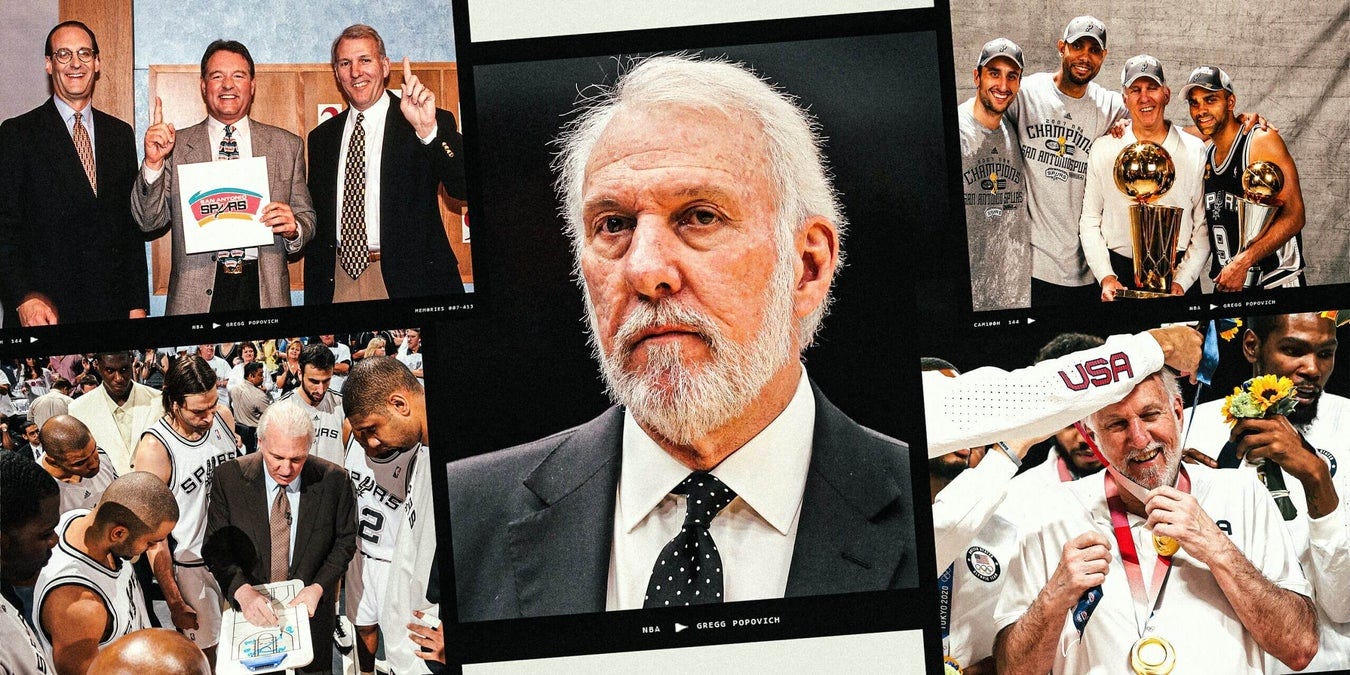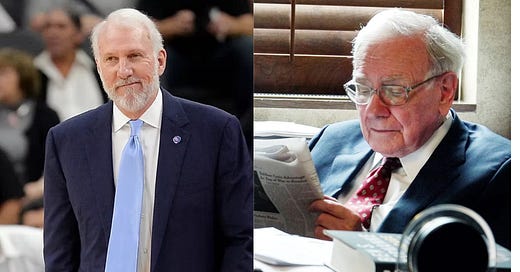Honoring Two Legends: Gregg Popovich and Warren Buffett
The Undervalued Traits Behind 30 Years of Spurs Success and $160 Billion in Wealth
Early May brought retirement news from two legendary figures: basketball coaching giant Gregg Popovich of the San Antonio Spurs and investment guru Warren Buffett of Berkshire Hathaway. In this post I will analyze a few under-appreciated aspects that made these two people great and highly deserving of tribute.
The End of an Era
After 30 years and 5 NBA championships Coach Pop will move into an exclusive front office role as President of Basketball Operations, signifying that he will still play a key role in basketball decisions. A stroke he suffered in December has made the day-to-day grind of NBA head coaching too challenging to continue. Popovich is 75 and Buffett is turning 95 later this year, and will step down as CEO of Berkshire at the end of year when longtime executive Greg Abel, his handpicked successor finally takes over.

Pop's Playbook: Adaptation Over Dogma
Popovich's greatness comes from several key factors. As the head coach he was ahead of the curve on play style and did a really good job of also adapting the team’s style of play to fit the players, rather than forcing a specific system onto the existing players. There’s some debate on which way is better, but it’s more likely that the more resilient and effective over the long run is a player-first offensive and defensive system. When you see a coach in any sport who can only coach and teach one way you are not surprised when they struggle or don’t adjust to different rosters and different evolutions in style, like more 3 point shooting or 5 out spacing.
Popovich was a great Xs and Os coach, which culminated in the 2013-2014 championship team that played a beautiful style of motion offensive basketball built around great spacing, cutting, screening, and ball movement. Duncan, Leonard, Parker, Ginobili, Green, Diaw, Mills, Bellinelli, Splitter, Bonner, Joseph, and Baynes will go down in history for amazing offensive and defensive play, and resiliency after having lost the championship in 7 games to the Miami Heat in heartbreaking fashion the previous year. This revenge season saw them dismantle the Miami Heat led by Lebron James, who would sign back with Cleveland the following season.
The Importance of Humility
One of the more underrated factors in Coach Pop’s success is his humility. He would always say that he would never have won five championships without Tim Duncan, who the Spurs were lucky enough to draft first in the 1997 NBA draft. A good coach knows that it’s the players who mainly drive winning and that’s seen in Pop’s last few years with the team where they have been perennially in the lottery. An arrogant coach is also less likely to know when they are at fault for a coaching decision and when the team just needs to play better or make personnel moves to get closer to a championship-level roster.
On a personal level Pop is famed for two key things—being a hard-ass coach and an extraordinarily kind and compassionate person. Popovich would not hesitate to curse you out and tell you when you’re not doing your job. And the fact that Duncan let him coach his that way made it so no other player on the roster could complain when he did the same to them. In today’s NBA players are far richer and grew up in both an age of social media but softer coaching comparatively. Coaches like Bob Knight and Pat Riley are not really in vogue right now. Knight’s style of coaching would not only have gotten him permanently cancelled, listen to this infamous halftime speech but possibly facing prison time. Knight certainly crossed a line that Popovich never did, like putting tampons in the locker of an Indiana player Landon Turner for being a “wimp”. That language is him being nice.
Billy Donovan, now Chicago Bulls Head Coach and Hall of Famer, once said of Rick Pitino who he played for in the 80s at Providence that he was really tough and demanding but he would give you shirt off his back. And that’s the type of coach you would run through a wall for. Popovich was one of those rare coaches.
Again, there is a difference between being verbally abusive and tough. Just as there are coaches who are too ingratiating or easy on their players. NBA coaches know that without the support or respect of their players they are out of a job.
Coach Pop was especially hard on a young player from France who was drafted 28th in the 2001 draft. This was during a time when teams were much more skeptical of European players. Tim Duncan recalled: “He was the hardest-coached individual of anybody I've seen in this entire program, and Pop apologized for that. Rightfully so, he did. He accepted every bit of it.”
Maybe Popvich didn’t have to be so cruel about it. But he expected great effort, responsibility, and unselfishness from his players, especially the team’s point guard. Without someone who pushes you towards what you are truly capable of it’s possible you don’t reach your full potential, and this applies to anything. Four championships and 17 seasons later Tony Parker is in the Hall of Fame
All in all, Popovich led a franchise as the type of coach players, coaches, and front office people wanted to be around. He was a consummate leader, wicked smart, a fierce competitor, and willing to adapt the program as players and the league changed. I don’t know if will see another NBA coach like Pop who led a team for 29 seasons (1996-2025) and for 22 seasons they made the playoffs (1998-2019), although Erik Spoelstra of the Miami Heat is going on 18 seasons, with two championships, as the closest comparison.
Buffett's Real Genius: Emotional Intelligence
Warren Buffett is also legendary for his longevity, and in investing, compound interest is the name of the game. As many people write hagiographies of Buffet’s deserving career I want to boil down on something underdiscussed that made him great. And that is his emotional intelligence or EQ.
The act of stepping down while he still has his faculties when it’s all too common place to see founders and CEO-types hang on for way too long or don’t have good succession plans in place. It’s also fundamental to the incredible decion-making skills Buffett possesses and his ability to consistently manage himself and others in a complex business world. For example, during the fear and panic of the 2008 Financial Crisis Berkshire made a $5 bn. investment in Goldman Sachs that was necessary to staunch the bleeding and restore confidence in the market. This investment also paid off handsomely to the tune of about $4 bn, an 80% return.
Buffett in 2008 had been doing this a very long time—he started his own investment partnership, Buffett Partnership Ltd., with $105,100 from friends and family in 1956 at the age of 26. He began buying Berkshire Hathaway stock in 1962 and three years later he took control of the company and turned it into a diversified holding company from a textile business.
Buffet actually started his investing journey even earlier—at the precious age of 11, buying three shares of Cities Service Preferred, a major oil and gas company, at $38 each. From the couple of hundred dollars he made back then in 1942, his 2025 net worth is between $160 billion and $168.2 billion, making him the fifth-richest person in the world.
Reading the Room: The American Express Scandal
A prime example of Buffett’s EQ was in 1963 when American Express faced a massive fraud scandal involving collateralized salad oil, causing its stock to plummet. What exactly happened? Allied Crude Vegetable Oil Company executives filled storage tanks mostly with water and topped them with a few feet of oil, the idea being oil floats on water, This was done in order to trick inspectors and obtain over $150 million in loans with this fake inventory as collateral. An anonymous American Express whistleblower would pour cold water on this and end the chicanery.
While most investors fled fearing the worst for the company’s future, Buffett showed remarkable emotional control and independent thinking. He conducted his own research, visited restaurants and talked to business owners to gauge whether the scandal had damaged the core trust consumers placed in the American Express brand. He determined that while the scandal was severe, the underlying business and its reputation with customers remained strong. Buffett was well-known for doing hours of homework on the fundamentals of the business, and his calm rational demeanor led to one of his most successful long-term investments in American Express.
A Lasting Legacy
Overall, Buffett’s financial returns are mind-boggling and it leads to monikers like genius or brilliant being thrown around, but are they precise enough for explaining Buffett’s accomplishments?
Business titans are often praised for their intelligence, foresight, ruthlessness, and complex management skills. And in a lot of ways these can fairly describe Buffett, but starting from his emotional intelligence and personality is a more accurate way to describe him. In the words of Buffett himself:
Both Popovich and Buffett succeeded not just through technical expertise, but through exceptional self-awareness and people skills. Pop knew when to push players and when to adapt his system. Buffett knew when to trust his research over market panic. In a world that often celebrates pure intellect or ruthless ambition, these two giants remind us that emotional intelligence— knowing yourself, understanding others, and maintaining composure under pressure is an overlooked factor in sustained excellence.
Buffett is the rare individual whose career and life offer timeless insights. There's a reason there are over 100 books that feature him significantly. What sets Buffett apart isn't just his returns, but his ability to remain fundamentally unchanged by enormous wealth and success—still living in the same Omaha house he bought in 1958 and approaching each investment decision with the same methodical curiosity he had as an 11-year-old.
As someone who's coached basketball, Popovich is someone I really looked up to when I first started studying coaching and the game seriously. His prickly demeanor with sideline reporters and sarcasm with media members were notable, but he was truly a great basketball coach—someone who knew the game, its fundamentals, and how to teach it, inside and out. The proof was in the beautiful, purist basketball style the Spurs played. Without him, the Spurs will never be the same.




